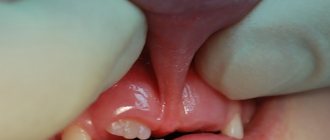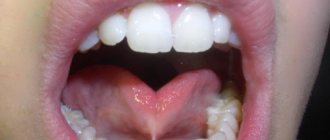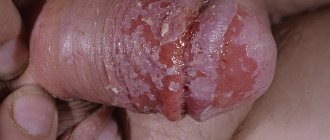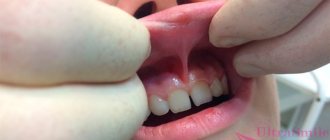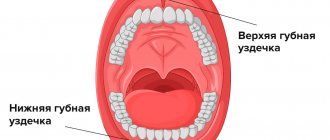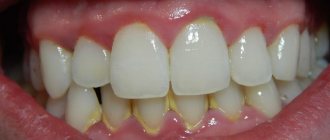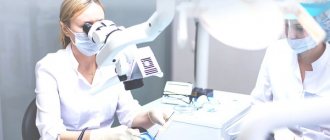But if surgical plastic surgery of the frenulum is still performed, then in our clinic it is only laser surgery.
This method has a number of advantages:
- smaller volume of anesthetic;
- the manipulation lasts only 10 – 15 minutes;
- the edges of the wound are instantly “sealed” (due to gluing the end sections of the vessels under the influence of the laser), which prevents bleeding;
- no need for stitches;
- 100% sterility of the surgical field, which eliminates the risk of complications;
- faster healing, facilitating the postoperative period.
What is lingual frenuloplasty?
The frenulum is a small membrane that connects the lower part of the tongue and the mucous membrane of the lower jaw. Despite its small size, it performs very important functions: it is responsible for the formation of dental occlusion, controls the mobility of the tongue and the functioning of the facial muscles.
There are three main pathologies of the tongue frenulum that require surgical correction.
- Wrong shape.
A healthy frenulum is a fold of mucous membrane in the shape of an arc. - Small size
(in medical terminology - ankyloglossia). The average length of the frenulum of the tongue in an adult is 3 centimeters; in a child it is shorter. In the case of ankyloglossia, the frenulum will not allow the tongue to be raised completely upward. - Incorrect mounting location.
A healthy frenulum is attached to the middle of the tongue, and with pathology it can be shifted to the tip.
In some cases, it becomes necessary to perform plastic surgery of the lip frenulum - the fold of mucous membrane connecting the lip and gum. The operation is performed to avoid impaired diction and the formation of malocclusion. Read more about lip frenuloplasty here.
Frenum trimming with laser
Laser frenulum trimming is a simpler, faster procedure that does not cause bleeding. Laser procedures are distinguished by their antibacterial effect, comfortable perception of the procedure by the patient, and the absence of a long recovery period. The laser beam instantly seals the vessels of the frenulum of the tongue, which does not require sutures. Pain relief is usually done using a gel or spray.
Don't be afraid to sign your child up for surgery. By solving the problem with the length of the frenulum, you will give your baby freedom of diction and free him from the feeling of constraint. Make an appointment at the Mira clinic for a consultation by phone.
Causes of tongue frenulum anomaly
Most children have mild pathology, but severe forms are also not uncommon. The size of a child’s tongue frenulum is most often determined by heredity, as well as the following factors:
- viral infection in the mother in the first and last trimesters;
- late toxicosis;
- exacerbation of chronic diseases during pregnancy;
- injuries in the abdominal area during gestation;
- taking potent drugs by the expectant mother.
Symptoms of a shortened frenulum
How to determine if your baby needs surgery? It is necessary to seek specialist advice. However, you can notice signs of a defect in the frenulum of the tongue yourself by paying attention to some details.
- The frenulum resembles a transparent film and does not have a vascular network.
- The tongue is inactive.
- The child cannot reach the upper palate with the tip of his tongue.
- When you move your tongue, clicks are heard.
- Chewing and swallowing are difficult.
- Diction is broken.
- The lower front teeth are turned towards the tongue.
Advantages of laser surgery at the Novostom clinic
- Individual approach. The specialists of the Novostom clinic are ready to take into account all your requests and wishes. They will assess the condition. If necessary, other specialists (speech therapist, orthodontist, etc.) will also join the examination.
- Prompt delivery, there are no queues. We don't make patients wait long. You can make an appointment at a time convenient for you.
- Comfort. During any interventions and preparation for them, patients are surrounded by the attention of the staff. We care about the emotional state of our clients. A pleasant pastime is guaranteed for everyone. You can familiarize yourself with the presented press, spend time with a cup of coffee, and use the Internet access. Even a child will not be capricious if you bring him to us.
- Safety. Treatment of periodontitis is carried out under sterile conditions in compliance with all sanitary and hygienic standards.
- Professionalism of specialists. To eliminate all problems, doctors use modern developments and techniques. They rely on both their existing knowledge and accumulated experience. This avoids any mistakes. By contacting us, you can be sure that all actions of specialists will be competent and accurate.
- Availability of necessary equipment. We have all the equipment and tools to carry out the proposed interventions. Our specialists use only high-quality consumables. Do you want to fix a deficiency? Are you planning to bring your child to the Novostom clinic? Contact us!
When and who needs tongue frenuloplasty?
Most often, an abnormality of the frenulum of the tongue can be diagnosed in a child immediately after birth. Then it is recommended to fix it. However, plastic surgery is performed on children of preschool and school age, as well as adults. The operation is indicated in the following cases.
- Violation of sucking in newborns.
If babies have a tongue frenulum that is too short, they cannot latch onto the nipple properly, resulting in underweight, fussiness, and poor sleep. - Diction defects.
Due to poor tongue mobility, children distort some sounds, especially “r”, “l” and hissing sounds. As a rule, the problem is discovered by a speech therapist in preschool age. - Abnormal shape of teeth and gums.
A tongue frenulum that is too short can interfere with proper growth of the lower jaw. This leads to incorrect positioning of the front teeth and gum recession. - Preparation for implantation and prosthetics.
Any deviations in the shape of the soft tissue from the norm can ultimately lead to implant failure, so they need to be corrected before surgery. The discomfort caused by the pathology of the frenulum of the tongue during the use of removable dentures, especially on the lower jaw, is also important: the structures simply fall out when talking or eating.
What pathologies require solutions?
Normally, the frenulum of the tongue starts from the tip of the organ and ends in the area of the lower incisors. It is located exactly in the center (bottom). These are the perfect sizes. The main pathology that occurs is a shortened frenulum, which leads to limited mobility of the tongue.
As for the frenulum of the lip (pathologies are mainly found on the upper one), then normally it should be located between the front incisors and at the base of the lip. Such a film can be very short, which will lead to tension on the mucous membrane, or excessively large and will overlap the front teeth.
Due to such pathologies, a complex of problems arises, without eliminating which you risk creating serious troubles in the child’s life. And they will have to be resolved over more than one year.
What happens if tongue frenuloplasty is not performed in children?
An abnormality of the frenulum of the tongue in children provokes the following serious consequences.
- Due to a violation of the sucking regime in infancy, the child may not receive enough nutrition and, as a result, lag behind in development.
- Children with tongue frenulum abnormalities may never learn to pronounce some sounds.
- Incorrect placement of the frenulum leads to underdevelopment of the lower jaw, resulting in the formation of an incorrect bite.
If pathology of the frenulum of the tongue has been identified in a newborn, it can be easily corrected by making an incision with a laser. At this age, you won't even need stitches. With age, the structure of the frenulum becomes more complex, new vessels appear in it, so plastic surgery of the frenulum in preschool and school-age children turns into a full-fledged surgical operation. Therefore, it is best to do it at the age of 5-6 years, when the child’s milk teeth are replaced by permanent ones.
Parents can determine whether their child needs surgery on their own. To do this, ask him to reach the upper palate with the tip of his tongue. If he cannot do this, or it hurts, he should consult a doctor.
Short frenulum and why it is dangerous
Shortening of the frenulum is understood as a decrease in its absolute length or its incorrect location, which makes it relatively short (i.e., the length remains normal, but its incorrect localization causes all the symptoms characteristic of shortening).
A short frenulum of the upper or lower lip in a baby can negatively affect the process of breastfeeding. In this case, the child cannot correctly position the nipple in the oral cavity and create a sufficient vacuum necessary for sucking and swallowing. Therefore, in order to get enough, the baby has to make significant efforts. The baby quickly gets tired and stops breastfeeding without being properly satisfied. Such children behave restlessly, require frequent breastfeeding, but do not gain weight well.
In children over 3 years old, a shortened upper frenulum can cause an increase in the interdental spaces between the upper incisors and their advancement sharply anteriorly. A short lower labial frenulum sometimes causes malocclusion.
Also, a decrease in size or incorrect location of any of them can have an extremely negative impact on speech function. Children 2 years of age who have not had this pathology diagnosed or corrected in time often do not pronounce individual sounds. Such speech defects are difficult to correct.
Operation techniques
There are two methods of performing tongue frenuloplasty: traditional (classical) and laser. This is a more modern and safer method. The laser allows the operation to be performed with great precision and does not cause bleeding after the procedure. In addition, there is no need for stitches, and healing time is significantly reduced. This is especially important if you need to perform laser frenuloplasty on a child: the baby will tolerate the procedure much easier.
Depending on what pathology of the frenulum is detected, the doctor uses one of three techniques: cuts the frenulum, removes it, or changes the attachment site. The number of cuts and their shape depend on the choice of technique.
Surgical correction
If a short frenulum is detected in the maternity hospital, then its trimming is carried out immediately. This is done so that the baby can properly take the nipple and eat properly. If shortening is diagnosed at an older age and is not corrected by speech therapy techniques, then three options for surgical treatment are possible:
- Frenotomy is cutting to increase its length.
- Frenectomy is a circumcision when it is almost completely excised.
- Frenuloplasty is a plastic surgery during which the place of its attachment in the mouth is changed.
Despite the fact that frenulum surgery itself is quite common, most parents have a lot of questions about this procedure. We will consider the main ones below.
Why trim?
A too small size of such a fold of the mucous membrane can cause difficulty sucking at the breast in infants, and problems with the pronunciation of certain sounds and with the arrangement of teeth in the permanent dentition in older children. To avoid such problems, pruning is required.
Do I need to prune?
Most doctors, including the famous Dr. Komarovsky, are of the opinion that a short frenulum should be trimmed if it adversely affects the child’s ability to suck milk or pronounce certain sounds.
When a short frenulum does not negatively affect the processes of sound production and bite formation, then in such cases surgical intervention is not required.
What kind of doctor cuts?
Typically, frenulum correction operations are the responsibility of a dentist.
At what age is it best to have surgery?
When the frenulum should be trimmed is decided individually for each child. If we are talking about a fold on the upper lip, then correction is done no earlier than 6 years. Typically, the operation is performed only after the eruption of the permanent upper incisors. If correction is required on the lower lip, this is done more often after the 4th year of life.
In most cases, the hyoid frenulum is cut before 1 year of age (most often this is done in the maternity hospital). But correction is possible at any age.
How do they prune?
The frenulum trimming operation is performed on an outpatient basis in the surgical office of a dental clinic. The doctor carefully stretches the fold of the mucous membrane and makes a small incision with a sharp scalpel. After that, small sutures made of threads are applied to the edges, which after some time dissolve on their own and do not need to be removed.
A more modern technique is laser dissection, which eliminates the need for stitches, which speeds up the child’s recovery process.
Does it hurt to prune?
The dissection procedure is performed under local anesthesia, which eliminates the possibility of any pain.
«
Therapeutic exercises
There are alternative methods that allow you to do without surgery, for example, a set of special exercises for developing the frenulum of the tongue.
- Reach alternately to the upper and lower lips.
- Extend your tongue and make pendulum movements from cheek to cheek.
- Suck your tongue to the roof of your mouth and let go, imitating a horse clopping its hooves.
- Place your tongue on each cheek with your mouth closed.
- Smile with your mouth open.
- Stretch your lips.
- Pull your lips into a tube, pretending to kiss.
To achieve results, you need to perform the exercises every day for 5 - 10 minutes. It is important to remember that this method is suitable for correcting mild disorders; more severe pathologies require surgical intervention.
NEW LEVEL
THERE ARE TWO IMPORTANT CONCEPTS ABOUT WOUND SURFACES IN THE ORAL CAVITY:
1. Healing and contraction of any open wound in the oral cavity occurs towards its center (hence the need to keep it as open as possible).
2. Two moist surfaces in the mouth that are in direct contact with each other re-grow well.
I believe stretching is necessary after a frenulum trimming procedure to achieve optimal results. The exercises do NOT require the use of force and do not take much time. It is necessary that the movements be fast and precise. Using an LED headlamp will help you achieve the best results.
To relieve pain, you can use Tylenol, Ibuprofen (if baby is 6 months or older), Arnica, Rescue Remedy (Ed. - Dr. Gaeri's recommendation), or other medications. I also recommend purchasing a soothing teething gel (without benzocaine or lidocaine, which are numbing ingredients), such as Hyland's Teething Gel or Orajel Naturals (not regular Orajel). These gels should be used during stretching exercises, and they will also help relieve pain immediately after completing the warm-up.
The main danger of cutting the frenulum is that wounds in the mouth heal very quickly. This can cause premature fusion, whether of the tongue or lip, resulting in new limitation of mobility and persistence or return of symptoms. The exercises shown below are best done with your baby lying on your lap (or on the bed) with his feet pointing away from you.
PRINCIPLES OF PERFORMING STRETCHING EXERCISES: WATCH THE VIDEO https://vimeo.com/86784777
STRETCHING
SIGNIFICANT DISCHARGE OR BLEEDING AFTER THE FRENALE CUT PROCEDURE IS CONSIDERED NORMAL, ESPECIALLY IN THE FIRST FEW DAYS. BLEEDING IS REDUCED TO A MINIMUM BECAUSE THE PROCEDURE IS CARRIED OUT WITH A LASER. BEFORE STARTING THE EXERCISES, WASH YOUR HANDS CAREFULLY (GLOVES ARE NOT NEEDED). APPLY A SMALL AMOUNT OF SOOTHING GEL ON YOUR FINGER BEFORE STARTING TO WARM UP. I RECOMMEND DOING THE EXERCISES 4 TIMES A DAY FOR THE FIRST 3 WEEKS AND THEN DURING THE 4TH WEEK, QUICKLY REDUCING THE NUMBER OF EXERCISE REPEATS FROM 4 TO 3, 2, 1 REPS PER DAY BY THE END OF THE 4TH WEEK.
Scheme by Dr. Sherwin Yazdi. The wounds are usually diamond shaped. It has 3 dimensions - height, width and depth. This is especially important for the sublingual wound, since it is much deeper than the wound under the lip. Working along these 3 dimensions is the key to successful healing.
The upper lip stretches more easily than the tongue. If you need to stretch your lip and tongue, I recommend starting with lip exercises. As a rule, children do not like this warm-up and may cry. This way, lip exercises allow for easier access under the tongue when the baby starts to cry. For the upper lip, simply place your finger under the lip and push it as high as possible (until you feel resistance). Then gently move your finger from side to side for a few seconds. Remember, the main purpose of this procedure is to use your finger to separate the moist opposing surfaces, the lip and gum, so that they cannot stick to each other.
The next area of stretching work is the tongue . Place both index fingers in your mouth (insert one first and move it toward your cheek to stretch your mouth, making room for the second index finger). Then use both index fingers to place them under your tongue and lift it towards your upper palate. You need to perform three separate stretching movements with your tongue:
1. With your fingers under your tongue, try to lift your tongue as high as possible (towards the upper palate). Hold it in this position for 1-2 seconds, then relax your fingers and repeat these steps again. The goal of the exercise is to fully open the diamond so that it is almost in the same plane (remember, the central horizontal fold line of the diamond is the place where fusion will first begin).
2. Lift and hold your tongue with one finger, place the other finger horizontally in the middle of the diamond and roll it like a roller from front to back, try to stretch the diamond as high as possible. Make sure that your finger movements when stretching this area are performed within the diamond. After this, repeat the movement on either side of the diamond (outside the diamond) to relax the muscles in the rest of the hyoid space.
WATCH THE VIDEO https://vimeo.com/98709935
SUCKING EXERCISES
It is very important to let your baby understand that not all manipulations that you perform with his mouth are associated with pain.
The following simple exercises can help you cope with uncoordinated muscle work during sucking or weak sucking movements. Their implementation helps to improve the quality of sucking:
1. Slowly move your finger along the lower gum from side to side, with your baby's tongue following your finger. These actions help strengthen the lateral muscles of the tongue.
2. Offer to suck your finger and pull it towards you, as if trying to slowly pull it out, while the baby tries to pull it back deeper into the mouth. These actions strengthen the language as a whole.
3. Offer to suck your finger and apply gentle pressure to the roof of your mouth. Then turn your finger over, gently press on the tongue and stroke the middle of the tongue.
A FEW DAYS AFTER THE TRIMING PROCEDURE, THE WOUND(S) WILL LOOK WHITE AND/OR YELLOW, WHICH APPEARS VERY MUCH RESEMBLY TO SUPUPURING.
This is a completely normal inflammatory reaction. Don't let your regular pediatrician, lactation consultant, friends who think they are experts, or anyone else give you wrong advice. If you still think you have an infection, call our office.
1 week after the procedure
1 week after the procedure
10 days after the procedure
5 days after the procedure
AFTER THE PROCEDURE, IT IS VERY IMPORTANT TO CONTINUE TO WORK WITH YOUR BREASTFEEDING CONSULTANT TO ENSURE OPTIMUM RESULTS.
CALL OUR OFFICE IN CASE OF AN EMERGENCY:
Uncontrolled bleeding
Refusal to breastfeed or bottle feed
High temperature >38.6°C
With the official permission of the author, translated by Veronika Makarova , breastfeeding consultant, Moscow, https://milkmomstory.livejournal.com
If you are interested in this topic, we invite you to watch the webinar Short frenulum of the tongue and consultation on breastfeeding
Go to other interesting translations of articles by foreign experts
Price for plastic frenulum of the tongue
The cost of this procedure usually consists of the cost of consultation and examination, local anesthesia and the service itself. This is a fairly simple surgical procedure, so no additional tests are required. The price of a classic operation (with a scalpel) for adults and children is the same, but may be slightly higher if the patient has too dense frenulum tissue. Then they do not give local anesthesia, but general anesthesia; it costs more, and, accordingly, costs increase due to this. The average cost of classic lingual frenuloplasty in Moscow is 3,800 rubles. The price for laser plastic surgery of the frenulum of the tongue is about 5,000 rubles.


